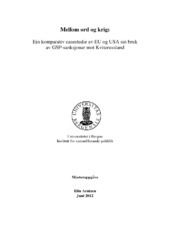| dc.description.abstract | This thesis aims to reveal the nature of the European Union as a sender of sanctions compared with the United States. The question I ask is; is the European Union less united as sender of GSP-sanctions than the US, and what causes can explain this? The cases that are studied in the thesis are the European Union's GSP sanctions towards Belarus in 2006 and the US's GSP sanctions towards the same target in 2000. Building on a theoretical framework of how strategic actors use economic sanctions, I first look at economic, political, geographical and ethical factors of using GSP sanctions. I also look at the judicial and institutional framework for the use of such sanctions. In this way, I may describe the main differences between the US and EU as senders of GSP sanctions towards Belarus. Second, I use the two leading theoretical definitions of actorness in order to answer whether or not the EU as a sender of GSP sanctions is less united than the US. The two definitions separate between an actor's behavior and an actor's legal capabilities. The findings suggest that the EU is a more fragmented sanction actor than the US, both in institutional and juridical terms. The EU as a united sanction actor suffers from the plurality of interests that exists among the member states. The US and most of the EU member states have little economic and political interests in Belarus. However, three EU countries stand out: Poland, Latvia and Lithuania. These countries have a closer economic and political relationship with Belarus than the other member states. Because of this relationship these countries voted against GSP sanctions towards Belarus. In the same vote, Greece and Cyprus also voted against the sanctions, while the Czech Republic and Slovakia abstained from voting. The analysis shows that Greece and Cyprus has close cultural and trade ties to Russia. This might be the reason for why these states voted against sanctioning Belarus. Also, the Czech Republic and Slovakia have closer historical and cultural ties to Belarus than most of the EU member states. This suggest that economic relationships and political ties on the national level matter highly when EU member states make decisions on whether or not they want the EU to use economic sanctions towards third parties. Furthermore, it also seems that there is a difference between how EU15 countries act towards each other and how they act towards the ten new member states when it comes to taking stands on EU common foreign policy. | en_US |
